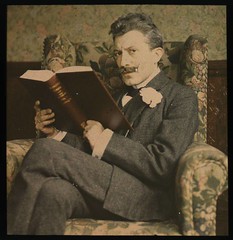
Genre: Horror
Topics: Psychic vampires, bisexuality (sort of), art, the artistic life, New York
Review:
Reginald Clarke is not your average vampire, in fact, he takes exception to that word. He doesn’t suck the blood from your body; he steals the ideas from your mind. Any bright young thing with talent that crosses his path is a target. Clarke’s latest victim is Ernest Fielding, a New York playwright. He’s taken young Ernest under his wing and into his home. Poor Ernest has no idea how his play, one he had only dreamed up recently, ended up onstage as Clarke’s latest masterpiece. Is he losing his marbles?
I chose to listen to The House of the Vampire simply because of the title. Doesn’t it sound like a Roger Corman film starring Vincent Price? Well, it’s not really all that scary. I mean, yes, someone stealing your creativity sounds unpleasant (though when I think of some of the TV plots of series out there now, I can’t help but wish someone had sucked that idea right out of the writer’s head), but there’s no bloodshed. Clarke is creepy, in an icky uncle kind of way. He’s charming though and manages to get all these young people to live with him. Perhaps they believe he can advance their careers.
I can haz ideas?
The House of the Vampire gets artsy in places and sometimes reads like a college essay. The characters discuss what is art and question whether or not there are any original ideas or do artists steal from one another all the time. Clarke just takes it to another level. I had to wonder if Viereck had a specific person in mind when he was writing Clarke. Who are the figurative vampires of artists?
The House of the Vampire is touted as the first gay vampire story. I don’t know about that. It’s all pretty vague. Obviously, Ernest is bisexual. He has relationships with both men and women throughout the story. The heterosexual relationship he has is the only one where talk of ‘making love,’ in the Victorian sense (“May I hold your hand? Oh, that’s nice!”), is referred. The men have “friendships.” Clarke’s sexuality, in my opinion, is neither here not there, since he’s an equal opportunist idea thief. If he wants your ideas, he doesn’t care what’s in your pants. I was impressed by the female character, Ethel, she’s no dummy. She doesn’t faint or need to be rescued. She is the only one with any sense, actually. I loved her. It did bother me that she kept calling Ernest “child.” She’s “near thirty,” seriously, she’s not an old biddy. But yay! for older ladies!! You go, girl!
Viereck prose does get purply; voluptuous is his favorite word. It’s a mercifully short book, so you don’t have to put up with it for too long. Although I dozed off a couple of times, I thought for the most part it was enjoyable and don’t feel like I wasted a day listening to it. The premise was interesting and the ending was unexpected. The setting of New York at the turn of the last century, with its electric lights and exciting cultural life where anyone could put on a play, made me want to go there. I just need a time machine. As long as you aren’t anticipating a traditional vampire tale, I think you’ll enjoy it too.
This was a LibriVox recording at just over 5 hours long. The narrator is Elizabeth Klett. She did a lovely job. Nice soothing voice. I suspect she changed venues during recording, or something, because a strange hiss appears during some sections and not in others. I didn’t mind this much though.
